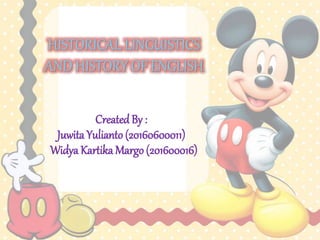
HISTORICAL OF LINGUISTIC AND HISTORICAL OF ENGLISH
- 1. HISTORICAL LINGUISTICS AND HISTORY OF ENGLISH CreatedBy : Juwita Yulianto (20160600011) Widya Kartika Margo (201600016)
- 3. Historical Of Linguistic • Historical Linguistic (also called diachronic linguistics) is the study of language change. • Diachronic : The study of linguistic change through history constrated to Synchronic. • Linguistic : The study of the phonological, morphological, and syntactic features of a language at a stated time.
- 4. Change Of Language • Language can change because of our physical, psychological or sociological nature and language can unavoidably change too. • Where there is variation, there is likely to be change (Suzanne Romaine)
- 5. • Languages that evolve from a common source are genetically related. These languages were once dialects of the same language. • Earlier forms of Germanic languages, such as German, English, and Swedish were dialects of Proto-Germanic, while earlier forms of Romance languages, such as Spanish, French, and Italian were dialects of Latin. • Furthermore, earlier forms of Proto-Germanic and Latin were once dialects of Indo-European.
- 6. Cognates in Indo-European English • THREE • MONTH German • DREI • MONAT Dutch • DRIE • MAAND Sanskrit • PITAR • BHRATHAR English • FATHER • BROTHER German • VATER • BRUDER Cognates West- Germanic Sub-Branch
- 7. Change Of Phonological • 1400 and 1600 CE, the Great Vowel Shift took place. The seven long vowels of Middle English underwent changes. • The high vowels [i] and [u] became the diphthongs [aj] and [aw]. The long vowels increased tongue height and shifted upward, and [a] was fronted. • Many of the spelling inconsistencies of English are because of the Great Vowel Shift. Our spelling system still reflects the way words were pronounced before the shift took place.
- 8. Change Of Morphological • Many Indo-European languages had extensive case endings that governed word order, but these are no longer found in Romance languages or English. • Although pronouns still show a trace of the case system (he vs. him), English uses prepositions to show the case. Instead of the dative case (indirect objects), English usually the words to or for. • Instead of the genitive case, English uses the word of or ‘s after a noun to show possession. Other cases include the nominative (subject pronouns), accusative (direct objects), and vocative.
- 9. Because of the lack of the case system, word order has become more rigid and strict in Modern English. Now it is strictly Subject – Verb – Object order.
- 10. Change Of Lexical • Old English borrowed place names from Celtic, army, religious and educational words from Latin, and everyday words from Scandinavian. Angle and Saxon (German dialects) form the basis of Old English phonology, morphology, syntax and lexicon. • Middle English borrowed many words from French in the areas of government, law, religion, literature and education because of the Norman Conquest in 1066 CE. Modern English borrowed words from Latin and Greek because of the influence of the classics, with much scientific terminology.
- 11. THE HISTORY OF ENGLISH The history of the English language really started with the arrival of three Germanic tribes who invaded Britain during the 5th century AD. Those tribes are the Angles, the Saxons and the Jutes, that crossed to the North Sea (Denmark and northern Germany).
- 12. A. Old English (450-1100 AD) The invading Germanic tribes spoke similar languages, which in Britain developed into what we now call Old English. Old English did not sound or look like English today. About half of the most commonly used words in Modern English have Old English roots. The words be, strong and water, for example, derive from Old English. Old English was spoken until around 1100.
- 13. B. Middle English (1100-1500) In 1066 William the Conqueror, the Duke of Normandy (part of modern France), invaded and conquered England. The new conquerors (called the Normans) brought with them a kind of French, which became the language of the Royal Court, and the ruling and business classes. For a period there was a kind of linguistic class division, where the lower classes spoke English and the upper classes spoke French.
- 14. C. Modern English 1) Early Modern English (1500-1800) Pronunciation (the Great Vowel Shift) started with vowels being pronounced shorter and shorter The Renaissance of Classical learning, meant that many new words and phrases entered the language. The invention of printing also meant that there was now a common language in print. In 1604 the first English dictionary was published.
- 15. The main difference between Early Modern English and Late Modern English is vocabulary. Late Modern English has many more words. Late Modern English has many more words, arising from two principal factors: firstly, the Industrial Revolution and technology created a need for new words; secondly, the British Empire at its height covered one quarter of the earth's surface, and the English language adopted foreign words from many countries. 2) Late Modern English (1800-Present)
- 16. C. Varieties Of English From around 1600, the English colonization of North America resulted in the creation of a distinct American variety of English. In some ways, American English is more like the English of Shakespeare than modern British English is. Today, American English is particularly influential, due to the USA's dominance of cinema, television, popular music, trade and technology (including the Internet). But there are many other varieties of English around the world, including for example Australian English, New Zealand English, Canadian English, South African English, Indian English and Caribbean English.